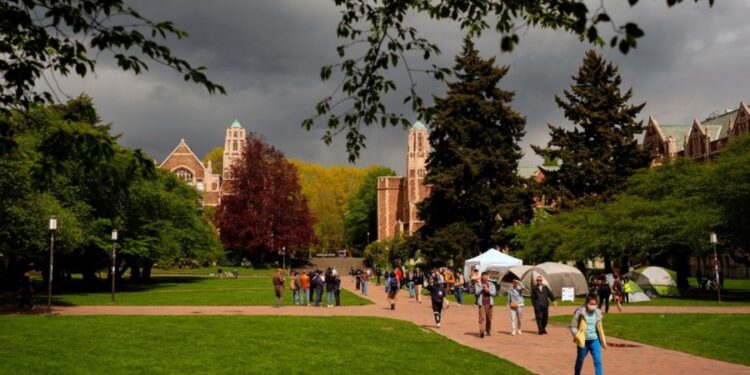
International students are holding their breath as President-elect Trump gears up to return to the White House.
Multiple schools have put out guidance on when foreign-born students should and shouldn’t go abroad to ensure they are in the U.S. in case the new president implements travel restrictions at the start of his term.
Both the documented and the undocumented could find themselves targets of Trump, who made immigration crackdowns the cornerstone of his campaign.
“I feel like there’s a lot more anxiety and panic among some disciplines more than others, or some nationalities more than others,” said an international student in Washington, D.C. who is applying for Ph.D. programs.
“We come here thinking, ‘This is where you can choose your future,’ and then, suddenly, realizing that maybe it’s not. I think it’s been a very big learning experience about governance and what international relations mean,” added the student, who requested anonymity.
Trump, who is set to be sworn in on Jan. 20, has promised sweeping immigration action right out the gate, including potentially revoking the visas and statuses of those who are here legally.
College administrators are sounding a warning.
“The immigration landscape is likely to change under the new presidential administration. This guidance is intended to inform and assist international students, faculty, and staff at Cornell University,” Cornell University said in a notice to students, particularly pointing to risks of travel bans involving Kyrgyzstan, Nigeria, Myanmar, Sudan, Tanzania, Iran, Libya, North Korea, Syria, Venezuela, Yemen and Somalia.
Cornell said students should carry additional documentation of their connection to the school — and get back in the U.S. before Jan. 21.
Seven of the nations it listed were the subject of the infamous Trump travel ban from his first term.
“We know that there were numerous policy efforts that were enacted that adversely impacted international students, even starting off in very first days in terms of the travel bans, which created chilling effects and, certainly, affected international students from a couple of countries, but also increased security vetting for international students from a good number of countries,” said Miriam Feldblum, executive director of the Presidents’ Alliance on Higher Education and Immigration.
“And, also, impacted family members of scholars and staff who were on campuses,” she added. This impacted “not just international students, but international populations in higher ed.”
The U.S. saw a record number of international students for the 2023-2024 academic year at 1.1 million.
“There was also the kind of increased scrutiny for international students from China and elsewhere,” Feldblum said of the first Trump administration. “And so, when we look at what’s ahead of us, we have to kind of look at the fact that these policies attempts may come right back up.”
But international travel bans could be the much smaller risk under a unified GOP government. Trump has pledged mass deportations and substantive changes to the immigration system, so even those currently in the U.S. legally could find the rug pulled out from under their feeet.
“Our major concern right now is impact on undocumented students on campus. There’s also, I think for many students who are of DACA status, concerns, because there’s been a lot of opposition to the program,” said Madeline Hsu, the director for the Center for Global Migration Studies at the University of Maryland.
“The concern is to try to ensure that members of our community feel safe and can continue to be able to pursue their educations,” she added, noting her community is in a sanctuary city.
While international students are anxiously watching the news and waiting from guidance from their schools, some caution it is still not clear what Trump will specifically do when he gets into office.
Daniel Bremer-Wirtig, the executive director of the nonpartisan International Student House in Washington, D.C., pointed to bipartisan support for international students and the “positive and very tangible economic benefits that international exchange brings.”
“I think the rhetoric may continue to be hot, but I would say that there is a question mark of how Congress will respond to some of the changes that the administration may be seeking to make that require legislation,” Bremer-Wirtig said.
And others say Trump has himself indicated that he understands the value of getting foreign-born students to live and work in the U.S.
“We know that candidate Trump said in June, ‘Oh, maybe we should give green cards to international students graduating from our college and universities.’ And, if we can think about the fact that there’s ongoing recognition across the political spectrum about the importance of talent — America needs talent. America needs global talent,” said Feldblum.
“And so, that also provides, potentially, some openings right for supporting international students’ success here in the U.S., and for helping to ensure that instead of having policies that deter international student, that create chilling effects, that reduce the recruitment and retention of international students, we work to ensure their success and retention and post-graduate pathways here,” she added.






